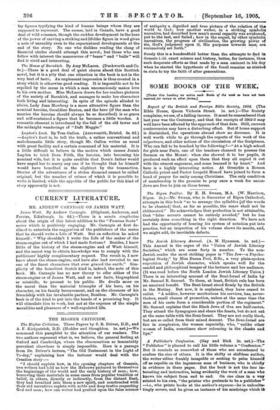James Watt. By Andrew Carnegie. (Oliphant, Anderson, and Ferrier, Edinburgh.
is. 6d.)—There is a sancta simplicitas about the origin of this latest addition to the " Famous Scots" series which is positively engaging. Mr. Carnegie at first de- clined to entertain the suggestion of the publishers of the series that he should write a Life of Watt. But on reflection he asked himself : " Why shouldn't I write the Life of the maker of the steam-engine out of which I had made fortune P Besides, I knew little of the history of the steam-engine and of Watt himself, and the surest way to obtain knowledge was to comply with the publishers' highly complimentary request. The result is, I now know about the steam-engine, and have also had revealed to me one of the finest characters that ever graced the earth." Sim- plicity of the homeliest Scotch kind is, indeed, the note of this book. Mr. Carnegie has no new theory to offer either of the steam-engine or of James Watt, and no new facts, biographical or scientific, to present to his public. He dwells more on the moral than the material triumphs of his hero, on his character, on his family bereavement, and on the closeness of his friendship with his invaluable partner, Boulton. Mr. Carnegie's book is of the kind to put into the hands of a promising boy. It will stimulate him to work, but not at the expense of the simple moralities and pleasures of n well-regulated life.










































 Previous page
Previous page